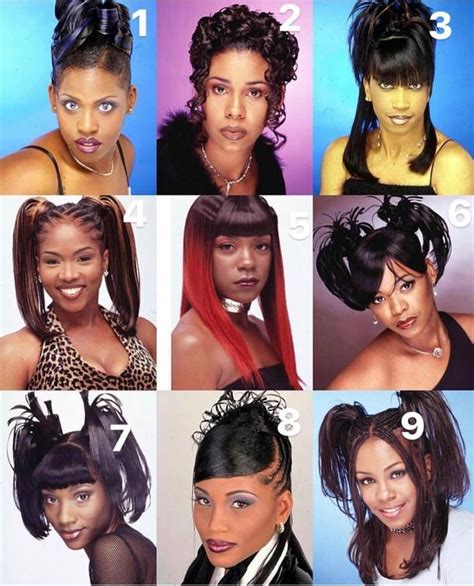The 1990s marked a golden era for Black hair, with a plethora of iconic and unforgettable hairstyles. From box braids to cornrows, the decade’s hairstyles exuded boldness, creativity, and a celebration of African heritage. In this nostalgic timeline, we delve into the most popular 90’s hairstyles for black hair, exploring their origins, cultural significance, and lasting impact.

1990-1992: The Rise of Box Braids
Box braids, a protective and versatile hairstyle originating from Africa, gained immense popularity in the early 90s. Characterized by square-shaped sections, box braids could be styled in various lengths, thicknesses, and colors. Their neat and sleek appearance made them a favorite among celebrities such as Alicia Keys, Janet Jackson, and Vivica A. Fox.
1993-1995: Cornrows Take the Center Stage
Cornrows, an intricate braiding technique believed to have originated over 5,000 years ago, remerged in the mid-90s as a symbol of Black pride and cultural identity. Woven into geometric patterns and flowing shapes, cornrows were worn by both men and women, showcasing their artistry and individuality.
1996-1998: Bantu Knots Embody Afrocentricity
Bantu knots, another protective style rooted in African tradition, gained widespread attention in the late 90s. These small, rounded knots, created by wrapping sections of hair around themselves, paid homage to the cultural heritage of Black Africans. They were often adorned with beads or accessories, adding a touch of glamour to the traditional look.
1999-2000: The Freedom of Natural Hair
As the 90s drew to a close, there was a growing movement toward embracing natural hair textures. Women of color, tired of chemical treatments that damaged their hair, began to showcase their natural curls, coils, and kinks. This shift towards natural hairstyles represented a celebration of self-love and a rejection of societal beauty standards.
The 90’s hairstyles for black hair left a lasting impact on the fashion industry, popular culture, and society as a whole. Here’s how they continue to resonate today:
Cultural Significance
These hairstyles served as powerful symbols of Black identity and empowerment. They celebrated African heritage and promoted a sense of community among people of color.
Fashion Influence
90’s Black hairstyles became synonymous with the hip-hop and R&B culture of the decade. They were featured prominently in music videos, magazines, and films, inspiring fashion trends worldwide.
Acceptance and Representation
The popularity of these hairstyles in mainstream media led to greater acceptance of natural hair textures and styles among people of all backgrounds. They challenged conventional beauty norms and paved the way for more inclusive representation in the media.
To achieve the iconic 90’s Black hairstyles, follow these tips:
Box Braids
- Use high-quality braiding hair that matches your natural hair texture.
- Divide your hair into small square sections.
- Braid each section tightly and evenly, wrapping the hair around itself in a clockwise direction.
- Secure the braids with rubber bands or string.
Cornrows
- Start with damp hair and apply a leave-in conditioner to prevent breakage.
- Divide your hair into rows following a desired pattern.
- Hold a section of hair at the front of the head and begin braiding it into a cornrow.
- Add hair from the sides as you braid, keeping the tension tight.
- Repeat the process until all rows are complete.
Bantu Knots
- Section damp hair into small squares or triangular shapes.
- Wrap each section of hair around itself clockwise until a knot forms.
- Secure the knot with a hair elastic or rubber band.
- Repeat the process for all sections.
Natural Hair
- Embrace your natural hair texture and avoid harsh chemicals or heat styling.
- Use products designed for curly or coily hair to define and moisturize.
- Protective hairstyles, such as twists or buns, can help prevent breakage and maintain healthy hair.
Table 1: Hairstyles by Type
| Hairstyle Type | Lengths | Textures | Colors |
|---|---|---|---|
| Box Braids | Short to long | Straight, curly, coily | Natural, colored |
| Cornrows | Short to long | Straight, curly, coily | Natural, colored |
| Bantu Knots | Short to medium | Curly, coily | Natural, colored |
| Natural Hair | Short to long | Curly, coily, kinky | Natural, dyed |
Table 2: Hairstyles by Decade
| Decade | Popular Hairstyles |
|---|---|
| 1990-1992 | Box braids, cornrows |
| 1993-1995 | Cornrows, Bantu knots |
| 1996-1998 | Bantu knots, natural hair |
| 1999-2000 | Natural hair, box braids |
Table 3: Hairstyles by Origin
| Hairstyle | Origin |
|---|---|
| Box Braids | Africa |
| Cornrows | Africa |
| Bantu Knots | Africa |
| Natural Hair | All hair textures |
Table 4: Hairstyles by Cultural Significance
| Hairstyle | Cultural Significance |
|---|---|
| Box Braids | African heritage, protection |
| Cornrows | African identity, self-expression |
| Bantu Knots | Pride in African ancestry |
| Natural Hair | Acceptance of diversity, self-love |
